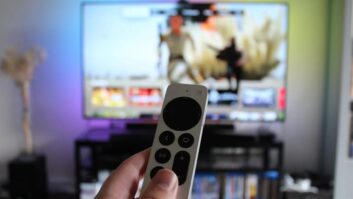
New York — Samsung has clarified the wording of the privacy policy included in the instruction manuals of its smart TVs to alleviate fears that voice-command functionality could lead to eavesdropping on customers’ private conversations.
A report on TechCrunch.com this week called attention to the possibility, after a tweet by an Electronic Frontier Foundation activist compared the privacy policy to a passage in George Orwell’s “1984.”
Samsung’s responded on its official blog, Samsungtomorrow, with a post titled “Samsung Smart TVs Do Not Monitor Living Room Conversations.”
The statement reads:
Samsung takes consumer privacy very seriously and our products are designed with privacy in mind. We employ industry-standard security safeguards and practices, including data encryption, to secure consumers’ personal information and prevent unauthorized collection or use.
Some Samsung Smart TVs offer voice recognitions functions. These functions are enabled only when users agree to the separate Samsung Privacy Policy and Terms of Use regarding this function when initially setting up the TV. Apart from initial setup, users are given the choice to activate or deactivate the voice recognition feature at any time.
Voice recognition takes place in two ways:
The first is through an embedded microphone inside the TV set that responds to simple predetermined TV commands such as changing the channel and increasing the volume. Voice data is neither stored nor transmitted in using these predetermined commands.
The second microphone, which is inside the remote control, requires interaction with a server because it is used for searching content. A user, for example, can speak into the remote control requesting the search of particular TV programs (ex: “Recommend a good Sci-Fi movie”). This interaction works like most any other voice recognition service available on other products including smartphones and tablets.
The following language in Samsung’s privacy policy has led to confusion:
“Please be aware that if your spoken words include personal or other sensitive information, that information will be among the data captured and transmitted to a third party through your use of Voice Recognition.”
We have clarified our privacy policy to better explain what actually occurs:
Voice Recognition
You can control your Smart TV, and use many of its features, with voice commands.
If you enable Voice Recognition, you can interact with your Smart TV using your voice. To provide you the Voice Recognition feature, some interactive voice commands may be transmitted (along with information about your device, including device identifiers) to a third-party service provider (currently, Nuance Communications, Inc.) that converts your interactive voice commands to text and to the extent necessary to provide the Voice Recognition features to you. In addition, Samsung may collect and your device may capture voice commands and associated texts so that we can provide you with Voice Recognition features and evaluate and improve the features. Samsung will collect your interactive voice commands only when you make a specific search request to the Smart TV by clicking the activation button either on the remote control or on your screen and speaking into the microphone on the remote control.
If you do not enable Voice Recognition, you will not be able to use interactive voice recognition features, although you may be able to control your TV using certain predefined voice commands.
You may disable Voice Recognition data collection at any time by visiting the “settings” menu. However, this may prevent you from using some of the Voice Recognition features.













